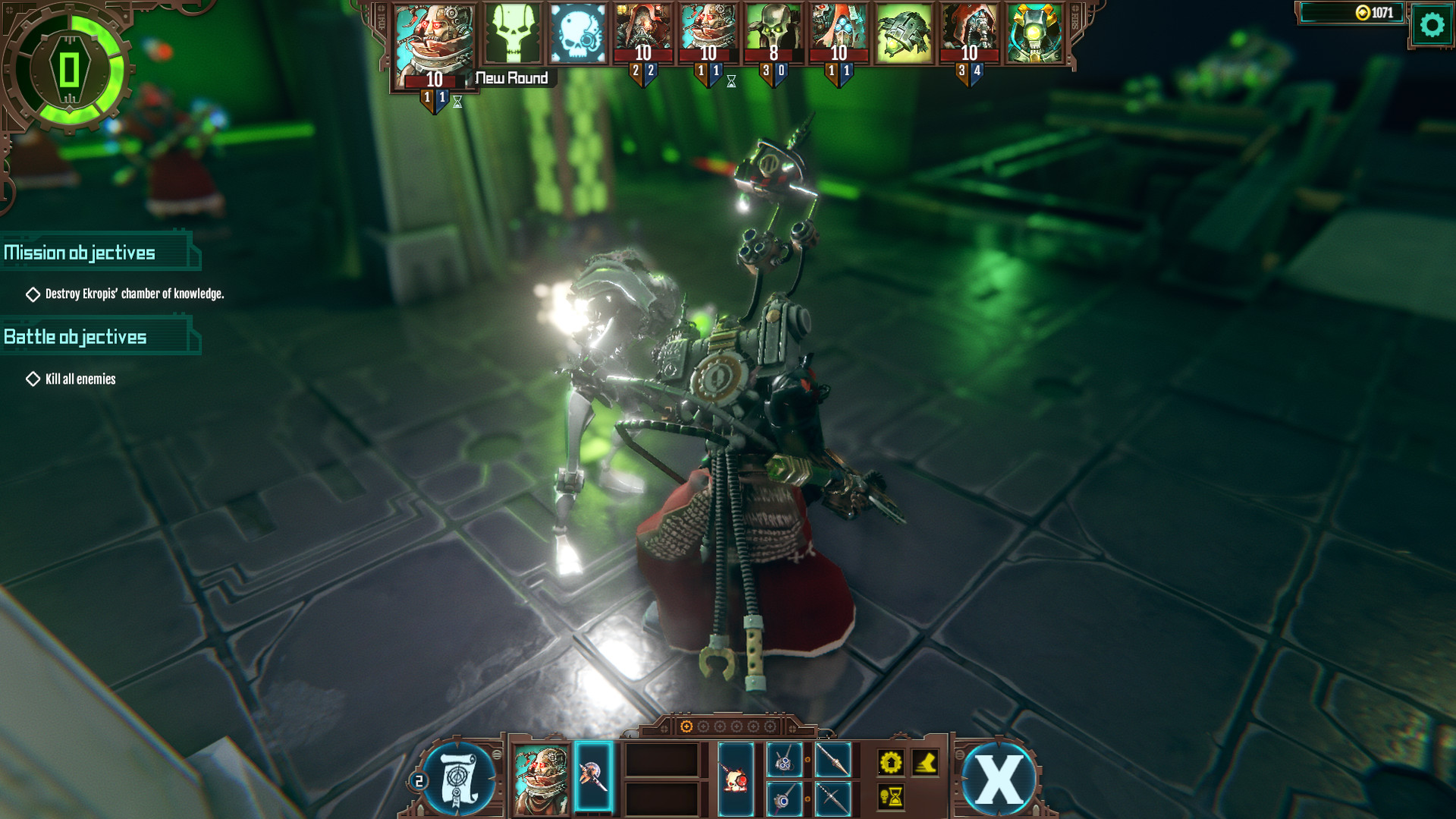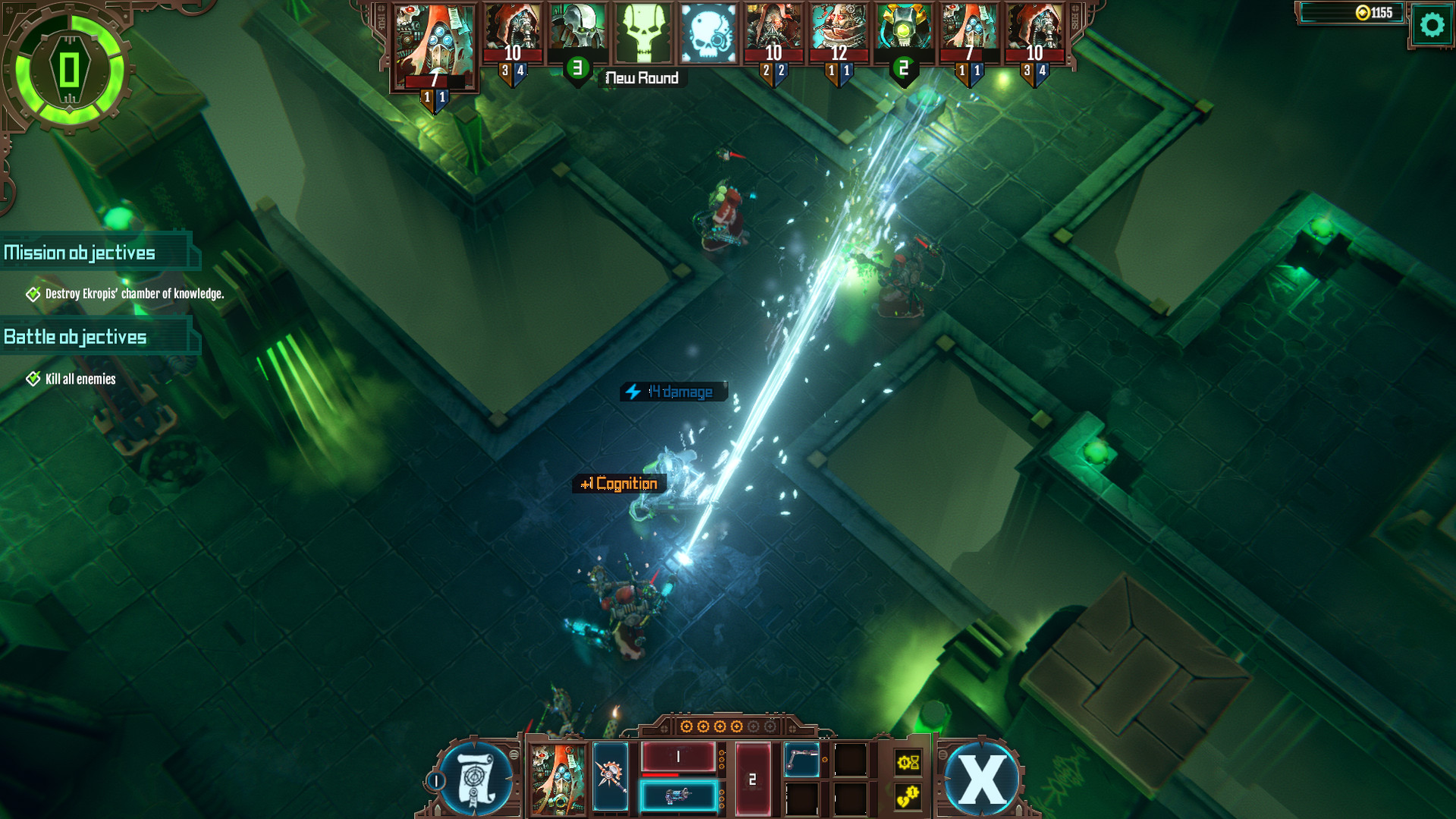Search
[{{{type}}}] {{{reason}}}
{{/data.error.root_cause}}{{{_source.title}}} {{#_source.showPrice}} {{{_source.displayPrice}}} {{/_source.showPrice}}
{{#_source.showLink}} {{/_source.showLink}} {{#_source.showDate}}{{{_source.displayDate}}}
{{/_source.showDate}}{{{_source.description}}}
{{#_source.additionalInfo}}{{#_source.additionalFields}} {{#title}} {{{label}}}: {{{title}}} {{/title}} {{/_source.additionalFields}}
{{/_source.additionalInfo}}Warhammer 40K: Mechanicus (PC)

Warhammer 40K: Mechanicus
Developed By: Bulwark Studios
Published By: Kasedo Games
Released: November 15, 2018
Available On: Windows
Genre: Strategy
ESRB Rating: M for Mature
Number of Players: Single-player
Price: $29.99
(Humble Store Link)
Many thanks to Kasedo Games for the review copy!
In recent years, there has been a storm of new licensed games based on the Warhammer 40,000 IP created by Games Workshop. Warhammer 40,000: Mechanicus is the first to feature the Mechanicum (also known as the Adeptus Mechanicus), an entity in the 40K universe based on Mars and utterly dedicated to the preservation and rediscovery of technology in the 41st Millenium. The Mechanicum is a playable faction in the Warhammer 40,000 tabletop wargame, and is now a computer game!
To understand the Mechanicum, imagine a society, based on Mars, that revolves around machinery and technology so completely that even their religion is based on the Omnissiah, also known as the Machine God. They replace their own body parts with cybernetic upgrades and believe that flesh is weak and inferior. The most highly regarded members of society are also those with the most and greatest cybernetic upgrades. Machinery is their religion. They do not have technicians, they have Tech-Priests. They do not have technical documents, they have litanies. They do not have procedures, they have rites. They do not have devices, they have relics. To have knowledge of technology is to be inducted into an order that is secretive, holy and exclusive.
The Mechanicum are the ones who construct the weapons, vehicles and engines of war for the Imperium of Man. Even the power armor worn by the Space Marines is crafted by the Mechanicum, and every Space Marine Chapter sends marines to Mars to learn, and return as Techmarines - still members of their chapter, but wearing modified armor, painted red like Mars, to acknowledge the Omnissiah.
One of the missions of the Mechanicum is to recover lost technology and pursuant to this goal, they search the galaxy for ancient human settlements, some of which lie under contemporary alien civilizations. Thus, we have the set-up for the story in Warhammer 40K:Mechanicus.
The Mechanicum has sent an expedition to the planet Silva Tenebris to search for archeotech (technological artifacts), but discovers that the world has become a Necron Tomb World. (Imagine an alien race who, eons ago, transferred their minds into mechanical bodies and now lie dormant, with a heavy ancient-Egyptian flavor.) Each mission has the player leading a cohort of Tech-Priests and attached personnel to clear out Necron tombs and recover whatever technology they can.
Each mission progresses over a map which features corridors and rooms that have puzzles, enemies and bosses. The player navigates from room to room and can choose their path through the tomb. It is not necessary to visit every single room, but all rooms with enemies in them must be cleared. The map displays which rooms contain enemies so that the player can plan ahead.
In the puzzle rooms, the player has to make choices based on the contents of the room. Sometimes it's choosing between Necron glyphs, sometimes it's a command decision the player has to make in response to events triggered by entering the chamber. When the player chooses correctly, they receive benefits which can include blackstone (the "currency" of the game), equipment, bonuses in battle, or debuffs for the Necrons. Choosing wrong results in buffs for the Necrons or damage to the player's cohort, sometimes both.

Strong Points: Excellent balance between complexity and playability, very faithful to the setting
Weak Points: Minor battle camera issues, decision points feel random
Moral Warnings: Violence, in-setting religion incompatible with real life spirituality, occult themes
I have very few complaints about this game, but one of them is that there doesn't seem to be a way to figure out the correct answers, and it feels like a guessing game. A strange device is located in one of the chambers. Do you destroy it, avoid it or take it for study? The answer is.... take your best guess. It may be that there really are clues and I'm just missing them. I have noticed that it does help to think like an utterly dedicated zealot though. Destroy that thing! It's blasphemy against the Omnissiah! More often than not, that yields the correct answer. To make matters a little harder, sometimes the Adepts in charge tell you what they'd like you to do, but that isn't necessarily the correct option.
The overall thread in the game is that the Necrons are waking up, and the level of wakefulness is expressed as a percentage. At 100%, the Necrons are fully awakened on a planetary scale. The percentage increases during gameplay, which is measured by the number of moves made on the map as well as the number of turns taken during combat. If the player explores every single room, there are more opportunities to collect benefits, but that also means risking penalties as well as giving the Necrons more time to awaken.
Between missions, the player has the opportunity to buy upgrades for their Tech-Priest cohort. Additional skills, cybernetic upgrades, weapons and armor are purchased using blackstone recovered from the tombs. There's plenty of variety in skill trees to choose from, but there is some overlap that makes it a little awkward to try to truly specialize. Even so, it's a great system that lets you customize your characters. I also liked that equipping items reflects on the appearance of the characters, making them feel truly unique. I only have two complaints here... one, there doesn't seem to be a cost listed for upgrades, so it's impossible to plan ahead. Options that you can afford are illuminated, but the exact cost isn't shown. Two, the characters' available equipment windows tend to get cluttered, and there doesn't seem to be a way to recycle or trash obsolete items.
There is also a variety of support troops that can be used to accompany the Tech-Priests on missions, with the player being able to control the exact makeup of the team.
Combat is, of course, the central feature. Battles are turn-based, with individual characters moving in initiative order. On a character's turn, they can move, interact with certain items in the environment, use abilities/equipment, and attack. Yes, I said 'and.' A character can perform any and all available actions, with the only constraint being the amount of available 'cognition,' which is spent to use certain abilities and weapons. Cognition can be replenished via a variety of means during battle, and a wise player chooses character builds and synergies to maintain a sufficient supply of cognition to use all the abilities desired during battle.
The combat system is very tactical, and easy to learn though hard to master. That's the key to a great system. I found myself really enjoying the tactical options and actions during combat.
I have to say, playing Mechanicus is the most fun I've had with a 40K video game since Space Marine. The upgrade system is simple, logical and doesn't need a bajillion different combat stats. Combat is simple and straightforward. There's two damage types: physical and energy. All weapons and armor operate by which of the two damage types they inflict or defend against. Characters have an armor stat for each, how much damage they can do of each type, and their hit points. I complain a lot about games that are overly complex with too much going on and too many stats. Mechanicus is what I've been longing for. Simple, yet not simplistic. You get a small toolbox, but you can do a LOT with those tools.
The production quality of the game is good, and doesn't try to do more than it can handle. There aren't really cutscenes, just dialogue between characters in the game's story. Generally when these characters talk to each other, it's in warbles and sounds that represent the binary communications between Adepts of the Mechanicum, so to follow them you have to read the subtitles. As a software engineer, I did get a kick out of how some of their language is expressed as pseudocode. For example, They might say "Victory = required" to express how important it is to win a battle, or "++Anticipation" to express increasing excitement about something that's happening soon.
Oh, and as a personal thank-you to the developers... THANK YOU for allowing manual saves in combat, in the map mode, and in between missions. The mission lengths are pretty reasonable, especially in the early game, but being able to save my place at any time is a real blessing. There's also an auto-save feature.

Higher is better
(10/10 is perfect)
Game Score - 96%
Gameplay - 19/20
Graphics - 10/10
Sound - 9/10
Stability - 5/5
Controls - 5/5
Morality Score - 76%
Violence - 6/10
Language - 9/10
Sexual Content - 10/10
Occult/Supernatural - 8/10
Cultural/Moral/Ethical - 5/10
In terms of stability, the game is pretty solid. I had no issues running Mechanicus on my Windows 10 machine. No crashes, no hangs, no glitches. Hats off to the QA team and developers over at Bulwark Studios! The only technical issues I had were when trying to move the camera around the battlefields or maps; holding the mouse against the edge of the screen didn't always work. Sometimes it would stutter and stop, even when I wasn't at the edge of the battle map yet. I just got used to using the arrow keys to control it.
The controls are pretty simple, with the interface being mostly mouse point-and-click, with supplemental help from the keyboard, especially for camera control. The tutorial does a good job of teaching the game and an there is an options screen for changing the keyboard configuration or for just reminding you of which key does what. Powers that have been used have a clear cooldown timer and the use of powers, abilities and weapons are consistent and intuitive. I did find that when things started to get into heavy close quarters, it was sometimes tough to click on just the right unit, but the camera zoom and rotate features helped to deal with that nicely.
The graphics are good and clean. Even with the battle map zoomed out it still wasn't difficult to distinguish between my individual characters, nor was it hard to tell different types of Necrons apart. The tomb maps are very simple but don't feel cheap or rushed. They're perfectly functional without a bunch of clutter. I also liked that even when the camera is zoomed in fully, the Mechanicum and Necron character models look fantastic. They're highly detailed without being overdone.
The music between battles sounds like organ music in a church, and during battles it's an odd sort of music that I can't quite describe, but it did suit the feel of the game very well. Sound effects were good and functioned as good audio cues for what happened on screen, though they didn't blow me away.
Morality. Let's talk about morality. A game like this one is complex because it doesn't have much in some of the overt categories that normally trigger adult-type content, such as language or sexuality. Mechanicus is completely devoid of sexuality in any context. Language was very mild, with the rare d- word that I almost didn't even notice. This is typical of Warhammer 40,000 themed games. I'd be very surprised to find sex and language in a 40K game beyond a PG-rated movie.
What Mechanicus delivers on however, is violence and occultism, being a 40K game. On the upside, the violence in Mechaicus is very mild by comparison with other titles in the genre. Characters fight and die, but there's almost no visible bloodshed (what else would we expect? It's cyborgs fighting robots... not a lot of blood there). When characters die they fall over and then dissolve, leaving no corpse.
What's troubling about Mechanicus is the story and gameplay are completely immersed in the religion of the Machine-God, consistent with the Warhammer 40k themes. Dialogue between characters frequently cites scripture verses from works that serve as their analog to the Scriptures. The visuals, music and writing are meant to evoke tropes associated with the Catholic Church of the Middle Ages, but having nothing whatsoever to do with Jesus Christ. Of course, this religion, like that of the Imperium at large, is utterly xenophobic and teaches no moral values of any kind that any religion in real life would find familiar. They worship the Omnissiah for its own sake and not for any spiritual uplift. Human life is not considered particularly valuable. There's no sense that human remains discovered in the tombs mean anything more than clues about the Necrons' methods.
As I said, none of that is unusual for a 40K game. That's just the setting. The Mechanicum is unique though, because their outlook on the body is that all flesh is weak and corruptible, which is why they do cybernetic upgrading. This is utterly at odds with the notion that Man was created in God's own image. They have contempt for God's greatest work, and that feels like blasphemy. When the game starts, the opening cinematic is a voiceover, and the first words it says are "From the moment I discovered the weakness of my flesh, it disgusted me." On the upside, this is all just fluff and story, and the player is not required to actually think in these terms to enjoy the game.
The only other noteworthy item is the nature of the Necrons themselves. Their theme, being modeled after Ancient Egypt, has more of a vibe of magic and mysticism than simple technology. Still, it is just technology.
So Warhammer 40K: Mechanicus, as a game, is incredibly fun. I found it to be the hardest game to put down in a long while. The missions aren't too short or too long, the customization feature isn't too simple or too complex, and the difficulty isn't too hard or too easy. Mechanicus is the Goldilocks of adventure/strategy games. It does have some morally troubling overtones, in terms of religion, but if you're used to the 40K setting this isn't going to be a problem for you.






